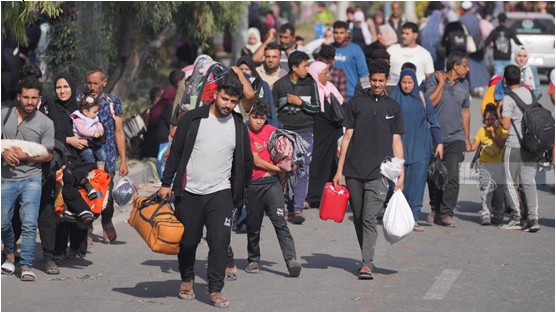Israeli Agriculture Minister Avi Dichter (Likud) was asked Saturday night by N12 about images of Palestinians Gaza residents evacuating south and whether that was a goal of the war, or only temporary. He described the situation as being “Gaza’s Nakba” and “Nakba 2023” – a reference to mass dispossessions of Palestinians after Israel was founded in 1948.

“Nakba 2023” in the Gaza Strip (Photo: WAFA)
Dichter who has been calling for over a decade to re-occupy Gaza, justifies the new Nakba and its aftermath as an “operational necessity to reduce” the heavily populated area for the Israeli soldiers and tanks to operate safely. Hundreds of thousands of Palestinians who remain in the north are struggling to get the essentials for their survival. Consumption of water from unsafe sources raises serious concerns about dehydration and waterborne diseases.
In addition, far-right Prime Minister Benjamin Netanyahu said on Saturday night that he opposed the return of the Palestinian Authority to Gaza. Saying that Israel would maintain “security control in Gaza for “as long as necessary” and that there “needs to be something else there,” rather than the PA. “I insist upon it,” he said. “There may be pressure on this issue. I don’t intend to cave.” He also rejected calls for a ceasefire, despite mounting international pressure for an end to the fighting which has fueled a humanitarian catastrophe in Gaza and driven its health system to breaking point.
Israeli shelling and ground attacks intensified around hospitals in Gaza city and northern Gaza on 11 November, with several being directly hit. According to media reports, civilians, patients, and staff were shot at while attempting to flee the Shifa hospital in Gaza city.
On Saturday, power at the Shifa and the Indonesian hospital (northern Gaza) was reportedly cut off after fuel for generators ran out; generators at Al Quds hospital (Gaza city) failed and could not be repaired due to the bombardment and fighting. At Shifa, two babies died when their life support stopped working and 37 babies in incubators are at imminent risk of death, according to the Ministry of Health in Ramallah.
On 11 November, following reports on the attacks hitting Shifa hospital, the OCHA Under-Secretary-General and Emergency Relief Coordinator, Martin Griffiths, stated: “There can be no justification for acts of war in health care facilities, leaving them with no power, food or water, and shooting at patients and civilians trying to flee.”
Hospitals are explicitly entitled to specific protection under international humanitarian law (IHL). They must not be used to shield military objectives from attack. Any military operation around or within hospitals must take steps to spare the patients, medical staff, and other civilians, who must be protected under IHL. All feasible precautions must be taken to avoid incidental civilian harm, including effective warnings, which take into account the ability of patients, medical staff and other civilians to evacuate safely.
The reported fatality toll since 7 October includes at least 192 medical staff, according to Ministry of Health (MoH) in Gaza. Of them, at least 16 medical staff were on duty when killed, according to the World Health Organization. Furthermore, 101 UNRWA staff have been killed, the highest number of UN personnel killed in a conflict in the history of the organization. Eighteen Palestinian Civil Defense personnel and 44 Palestinian journalists have also been killed since this crisis began.
On 11 November, following the collapse of services and communications at hospitals in the north, the MoH in Gaza did not update casualty figures. The Palestinian fatality toll in Gaza as of 10 November at 14:00 stood at 11,078, of whom 4,506 were said to be children and 3,027 women. About 2,700 others, including some 1,500 children, have been reported missing and may be trapped or dead under the rubble, awaiting rescue or recovery. Another 27,490 Palestinians have reportedly been injured.
Related: https://maki.org.il/en/?p=31327


